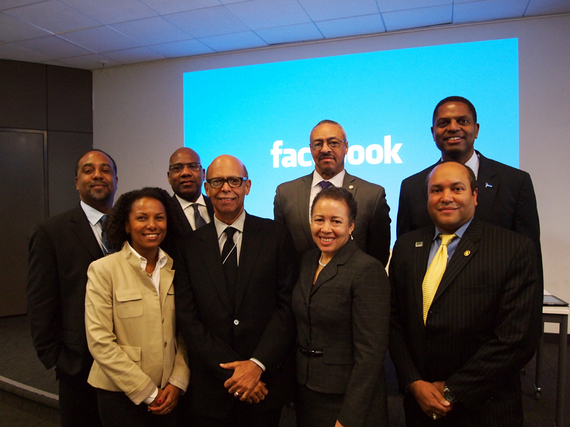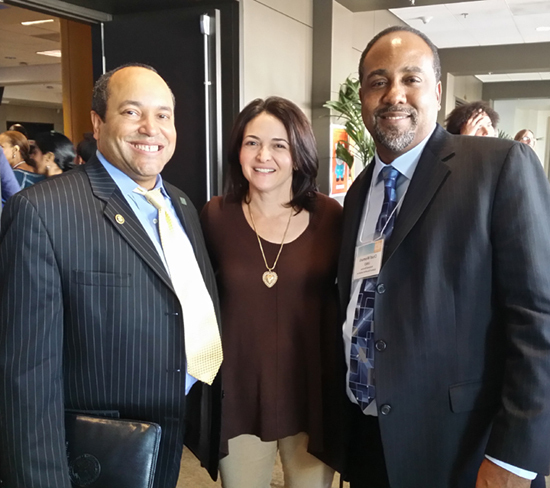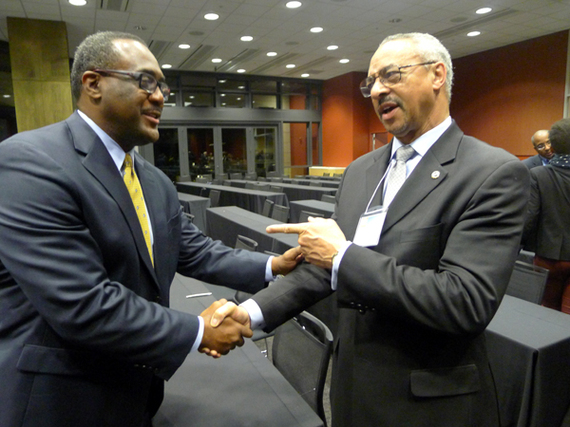Where are all the black tech innovators in America?

By Mike Green
 Where are black tech innovators in America?
Where are black tech innovators in America?
It’s a good question that was raised in Silicon Valley two years ago when Angela Benton met legendary investor Mitch Kapor and founded NewMe, the first accelerator in Silicon Valley focused on black startup founders. Soledad O’Brien’s “Black in America” series catalyzed a national debate when it spotlighted the NewMe Accelerator and the controversy over a dearth of black tech talent in Silicon Valley. Earlier this year, Chad Womack, Ph.D., National Director of STEM Education at the UNCF (United Negro College Fund), made it his personal quest to address the question. And that was the genesis of the idea to produce an unprecedented gathering of HBCU leadership in Silicon Valley.
Connecting the Disconnected:
The challenges facing the landscape of tech innovation and economic inclusion are difficult to ignore. In the aftermath of the Great Recession, America has come to realize it cannot achieve its economic competitiveness goals when so much of its talented landscape is producing so little. For example, black entrepreneurs represent the fastest growth rate of entrepreneurship in the nation at 60 percent, which is more than triple the national average (18 percent). Yet, all U.S., black-owned businesses combined (1.9 million) produce less than 1 percent GDP, and so few jobs that the numbers register as statistically nil.
The work of The America21 Project to change the economic narrative across the nation has expanded awareness for long-term investing in establishing inclusive economic frameworks across an increasingly multicultural 21st century America. President Obama continues to point to STEM education (science, technology, engineering and math), innovation and high-growth entrepreneurship as the pipeline for producing much-needed jobs and increasing the nation’s overall economic competitiveness. Yet, in Silicon Valley, the top region in the nation for tech innovation and investing in high-growth enterprises, knowledge of the fastest-growing landscape of entrepreneurs also registers as statistically nil.
The UNCF recognized the problem of disconnected innovation landscapes (HBCU and Silicon Valley) and sought to address it by bringing them together.
HBCU Innovation Summit:
Fast-forward to late October 2013. Delegations of presidents, provosts and deans from 17 HBCU (Historically Black Colleges and Universities) landed in Silicon Valley to attend the inaugural four-day HBCU Innovation Summit that would introduce a 21st century vision for a collaborative relationship between the landscapes of HBCU innovation and the number one hub of innovation in the world, Silicon Valley. This historic relationship, made possible through collaboration between Stanford University and the UNCF, led by Dr. Michael Lomax, would establish a promising foundation upon which a national framework for economic inclusion may soon be built.

UNCF leaders pose with HBCU leadership at Facebook during the HBCU Innovation Summit, Oct 29 – Nov 1, 2013. From left (front row): Maxine Williams, head of Global Diversity at Facebook; Dr. Michael Lomax, CEO of UNCF; Dr. Beverly Tatum, President of Spelman College; Ken Tolson, Advisory Committee Member, White House Initiative on HBCU; From left (back row): Dr. Chad Womack, Director of STEM Education and Merck Fellows Program at UNCF; Dr. David Wilson, President of Morgan State University; Dr. Carlton Brown, President of Clark Atlanta University; Dr. Karl Reid, Vice President at UNCF.
Tech Innovation Leadership:
Ironically, one of Silicon Valley’s top tech innovators is an HBCU alum. Today, John Thompson sits on the board of Microsoft and is the CEO of Virtual Instruments in San Jose. He is formerly the CEO and Chairman of the board of Symantec, a company he led for 10 years, starting just before the turn of the turn of the century. At the time, Thompson was the only black man in America leading a major technology company, which he grew into a global giant worth more than $6 billion. In 2005, he led a merger with Veritas worth $11 billion. Thompson is a product of Florida A&M University (FAMU). His story is just one of many black innovators that, if known, could raise national awareness and greater interest in investing in developing an economic infrastructure connected to local innovation ecosystems and resources that could bolster the landscape of black innovation. The HBCU Innovation Summit could be a catalyst for generating awareness and strategic alliances across disconnected sectors of society.
HBCU Ice is Cool:
Dr. Womack, the architect of the HBCU Innovation Summit, introduced his vision for the HBCU Innovation, Commercialization and Entrepreneurship (ICE) collaborative during the summit at Stanford. Through the UNCF’s 21st century visionary HBCU ICE platform (currently in planning / fundraising stage), the landscape of faculty and student innovators across HBCU campuses can partner, collaborate and compete in a knowledge-based, tech-driven, globally competitive innovation economy. The idea of such a strong collaboration of HBCU schools, producing a pipeline of productivity and deal flow, was so compelling that it attracted the Kapor Center for Social Impact, Google, Facebook, Andreesen Horowitz, Texas Instruments, Silicon Valley Bank, NorTech, and even the White House, to the summit (see a full list of partners and sponsors here).

Ken Tolson, Advisory Committee Member to the White House Initiative on HBCU (left) and Chad Womack, PhD, National Director of STEM Education at the UNCF (United Negro College Fund) pose with Sheryl Sandberg, Facebook COO, during a visit to Facebook headquarters by attendees of the HBCU Innovation Summit, Oct. 29 – Nov 1, 2013.
Inclusive Competitiveness:
Nearly 100 attendees, including more than 50 HBCU delegates, were hosted by the Stanford Center for Professional Development and Stanford’s National Center for Engineering Pathways to Innovation (EpiCenter).
Already there’s a noticeable positive impact from the summit, as leaders from tech-based economic development organizations, federal agencies, private equity, technology corporations and national foundations are becoming aware of the significant amount of black entrepreneurial talent that’s been hidden in America’s blind spot for decades. As media produce more stories, profiles and features focusing on HBCU innovation, the activity could facilitate a national awareness that serious solution-oriented approaches to America’s economic competitiveness problem starts with inclusion.
The HBCU Innovation Summit was a good start that enlightened leaders from two disconnected sectors of society of possible solutions inherent in their collaboration. The summit also included the vision of Johnathan Holifield, Esq., Vice President of Inclusive Competitiveness at NorTech, a tech-based economic development powerhouse covering 21 counties in northeast Ohio. Holifield is the “Father of Inclusive Competitiveness,” and is fueling a growing awareness of investment opportunities in economic inclusion frameworks across the TBED and iBED (Innovation-based Economic Development) landscape.

Johnathan Holifield, Esq., Vice President of Inclusive Competitiveness at NorTech (left), shakes hands with Dr. Carlton Brown, President of Clark Atlanta University, during the HBCU Innovation Summit at Stanford University, Oct. 29 – Nov. 1, 2013.
Investing in Inclusion:
With so many foundations, policymakers, corporations and investors seeking answers to developing a stronger landscape of economic inclusion via STEM education, the UNCF has established itself as a leading legacy institution connected to the landscape of HBCU with the right vision at the right time. It’s time to invest in scaling up the HBCU ICE collaborative. Given the intermediary reach of the UNCF to dozens of HBCU institutions that represent key channels to R&D, tech transfer and high-growth entrepreneurship in black America, investing in the HBCU ICE infrastructure and establishing a flowing pipeline to productivity could be considered a 21st century national economic imperative.
With the author’s permission, this is excerpted from a post that first appeared on Huffington Post Black Voices. Mike Green is an award-winning journalist and founder of The America 21 Project, which helped to organize the HBCU Innovation Summit.
All photos by Dwayne Johnson and Mike Green.


